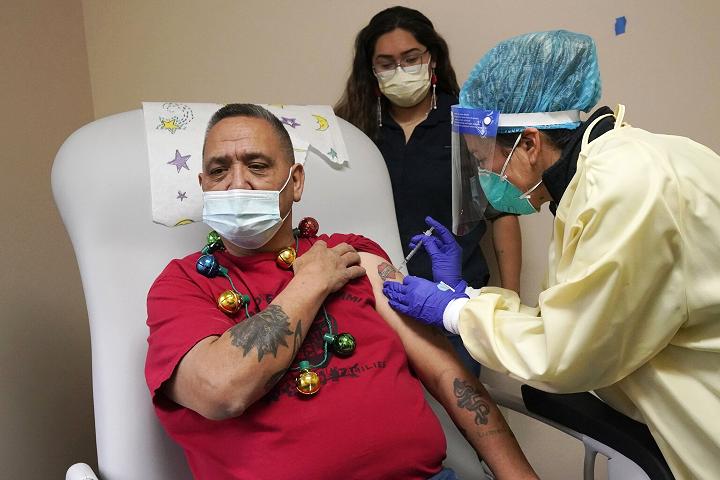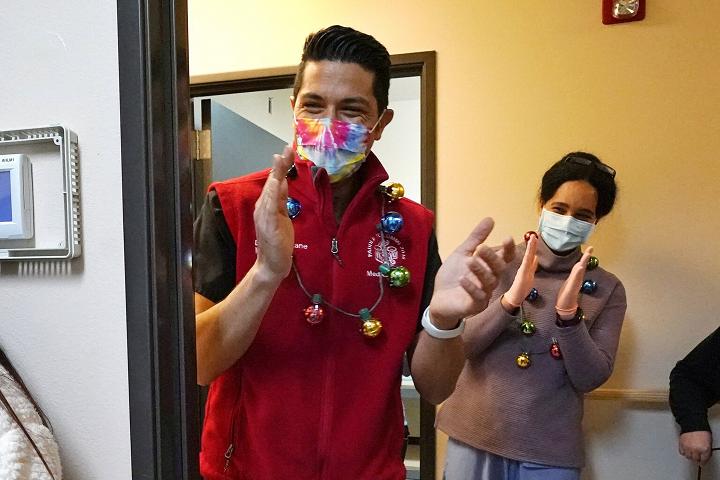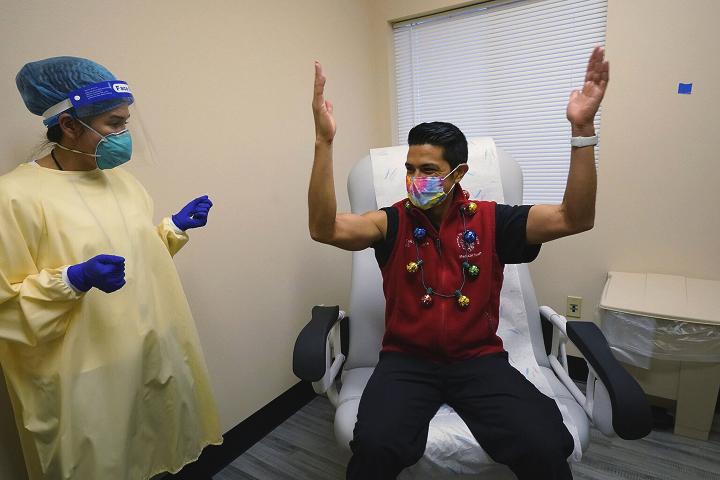 |
Canku Ota
|
 |
|
(Many Paths)
|
||
|
An Online Newsletter
Celebrating Native America
|
||
|
DECemBER 2020 - Volume
18 Number 12
|
||
|
|
||
|
Lummi Nation Begins
COVID-19 Vaccinations, Starting With 300 Doses
|
||
|
by Evan Bush - Seattle
Times staff reporter
|
||
The Lummi Nation began vaccinations Thursday, becoming one of the nation’s first to provide protection to its tribal members against a disease that has had an outsized and devastating impact on some American Indian and Alaska Native communities. The tribal nation received 300 doses of Pfizer’s vaccine Tuesday, said Dr. Dakotah Lane, medical director of the Public Health Department and a Lummi Nation member. “A huge relief,” Lane said Wednesday, before the vaccination. He added that receiving the first shipment of vaccine was an “emotional moment.” Tribal elder James Scott, a facilities worker and one of about 80 people who work at the community clinic was the first to be vaccinated. Efficient delivery of vaccine doses could help turn the tide against a disease that has disproportionately harmed Native American communities. Nearly 2,700 American Indians and Alaska Native had died of COVID-19 as of early December, according to the Centers for Disease Control and Prevention. Native Americans represent a disproportionate number of COVID-19 cases and deaths nationwide. The trend is pronounced among Native Americans between the ages of 20-39, who have died at rates more than 10 times that of white Americans from the disease. The Lummi Nation — which is under a shelter-in-place order — has taken stringent measures to prevent the spread of COVID-19. It has developed its own contact-tracing program, created COVID-19 testing protocols and developed a quarantine policy that includes housing, Lane said. The tribe has had 133 positive cases and four hospitalizations but no deaths from COVID-19.The Lummi Nation received its vaccine doses through the Indian Health Service (IHS), a division within the federal Department of Health and Human Services. Native American communities could choose to partner with states for distribution, or order directly through IHS. As a sovereign tribe, the Lummi Nation determined priority for vaccinating its more than 5,000 members, who live on an oceanside reservation. “We are quite familiar with who is most at risk,” Lane said. The community decided that its health team would be vaccinated first, along with those at Little Bear Creek retirement and assisted-living facility and members of the police department.
The first round of vaccines will be enough to cover anyone who wants the vaccine among those groups, Lane said. Vaccination will not be mandatory for anyone. Tribal elders, community workers and gravediggers who provide services to grieving families were among those in the next priority group, followed by high-risk medical patients, teachers and then the general population.The Lummi Nation pulled out of participation in AstraZeneca’s vaccine trial in October, after community concerns and what the tribe described in a news release as “communication issues” with the pharmaceutical company. Lane said concerns stemmed, in part, from his lack of communication to tribal members, out of worry over a widely reported adverse event in the AstraZeneca trial and because of comments from President Donald Trump about speeding vaccine approval. “The community already had a general mistrust of the federal government. And when the president comes out and says there will be a vaccine by the election, bypassing regulatory procedures, there was concern it would be rushed without good oversight,” Lane said, adding that mistrust dates to diseases that arrived with white colonizers and from unethical research performed by scientists decades later. Lane said difficult conversations resulting from the AstraZeneca trial, and its cancellation, might have helped prepare the community for Pfizer’s vaccine.
“It opened up the community’s eyes to what the solution to the pandemic might be,” Lane said, adding that the community challenged him with tough questions. In July, as part of preparations to take part in vaccine trials, the Lummi Nation ordered a freezer for ultracold storage, meaning the tribe already had secured space suitable to store Pfizer’s vaccine and before health care agencies across the country were seeking such equipment.Like Washington state, Lane said the Lummi Nation experienced a fall surge in COVID-19 cases, which prompted more interest in vaccination. Lane said his job now is to ensure tribal members who want the vaccine can get it and also to be frank about the risks and benefits of vaccination. “Our health team is focused on making sure Lummis, and the people we serve, have access,” Lane said.Other Native American communities have begun vaccinating, too. Pfizer vaccinations began Tuesday among health workers at clinics across the Navajo and Hopi nations in portions of Arizona and New Mexico, where 3,900 doses were escorted by police to clinics. COVID-19 has roamed relentlessly among the Navajo Nation’s multigenerational rural households. Navajo health officials have confirmed 20,000 coronavirus cases across the reservation and at least 727 deaths since the pandemic began. |
||||||
|
|
|
|
||
|
|
||
| Canku Ota is a free Newsletter celebrating Native America, its traditions and accomplishments . We do not provide subscriber or visitor names to anyone. Some articles presented in Canku Ota may contain copyright material. We have received appropriate permissions for republishing any articles. Material appearing here is distributed without profit or monetary gain to those who have expressed an interest. This is in accordance with Title 17 U.S.C. Section 107. | ||
|
Canku Ota is a copyright ©
2000 - 2020 of Vicki Williams Barry and Paul Barry.
|
||
 |
 |
|
|
The "Canku
Ota - A Newsletter Celebrating Native America" web site and
its design is the
|
||
|
Copyright ©
1999 - 2020 of Paul C. Barry.
|
||
|
All Rights Reserved.
|
||


